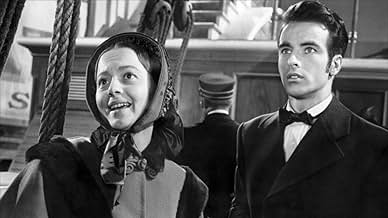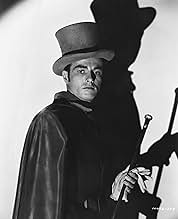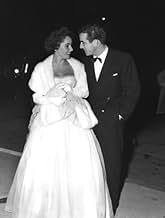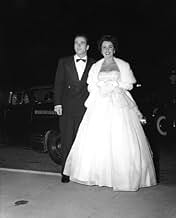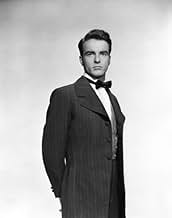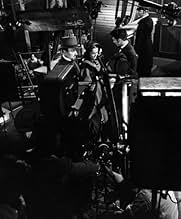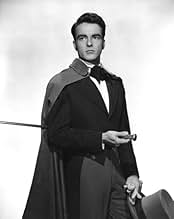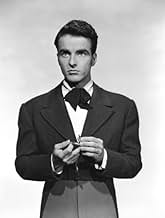CALIFICACIÓN DE IMDb
8.1/10
18 k
TU CALIFICACIÓN
Una joven ingenua se enamora de un apuesto joven del que su padre, un abusador emocional, sospecha que es un cazador de fortunas.Una joven ingenua se enamora de un apuesto joven del que su padre, un abusador emocional, sospecha que es un cazador de fortunas.Una joven ingenua se enamora de un apuesto joven del que su padre, un abusador emocional, sospecha que es un cazador de fortunas.
- Dirección
- Guionistas
- Elenco
- Ganó 4 premios Óscar
- 13 premios ganados y 9 nominaciones en total
Mary Bayless
- Party Guest
- (sin créditos)
Nan Boardman
- French Maid
- (sin créditos)
Jack Chefe
- French Waiter
- (sin créditos)
Marcel De la Brosse
- French Porter
- (sin créditos)
Ray De Ravenne
- French Waiter
- (sin créditos)
Opiniones destacadas
10eadoe
One of my favorite movies, based on one of my favorite books. Henry James sitting in the audience would have been proud of this insightful filming of his novel, "Washington Square," because the film retains so much of the subtlety of his own writing. Usually, Hollywood eliminates any of the subtlety of a great author's voice (see the recent remake of "Washington Square" if you want to see a real Hollywoodization of a novel – it actually depicts a young Catherine peeing her pants in public – an inane "Animal House"-type Hollywood requirement that degrading a woman by showing her peeing is an erotic boost for any movie). But "The Heiress" is pure James. Olivia de Havilland is perfect as James' unlikely heroine, going from an awkward gawky girl eager to please her beloved father, to a simple, loving young woman who steadfastly stands by her lover, to an embittered middle-aged woman who understands that, as Henry James says, "the great facts of her career were that Morris Townsend had trifled with her affection, and that her father had broken its spring."
If you liked this movie, read the novel. Listen to James' descriptions of Catherine and her father and see if this isn't exactly what Ralph Richardson and Olivia deHavilland portrayed:
"Doctor Sloper would have liked to be proud of his daughter; but there was nothing to be proud of in poor Catherine."
"Love demands certain things as a right; but Catherine had no sense of her rights; she had only a consciousness of immense and unexpected favors."
" 'She is so soft, so simple-minded, she would be such an easy victim! A bad husband would have remarkable facilities for making her miserable; for she would have neither the intelligence nor the resolution to get the better of him.' "
"She was conscious of no aptitude for organized resentment."
"In reality, she was the softest creature in the world."
"She had been so humble in her youth that she could now afford to have a little pride . . . Poor Catherine's dignity was not aggressive; it never sat in state; but if you pushed far enough you could find it. Her father had pushed very far."
Clifton Fadiman, in his introduction to "Washington Square," says that the novel's moral is: "to be right is not enough. Dr. Sloper is 'right'; he is right about the character of Townsend, he is right about his own character, he is right about the character of Catherine. But because he can offer only the insufficient truth of irony where the sufficient truth of love is required, he partly ruins his daughter's life, and lives out his own in spiritual poverty."
Dr. Sloper's contemptuous "rightness," penetrating and accurate as it is, is no substitute for the kindness and love his adoring daughter craves from him. In "The Rainmaker," a great Katharine Hepburn movie, also about a plain woman seeking love, only this time with a loving father, the character of Hepburn's father sums up this moral that "to be right is not enough" when he says to his self-righteous son: "Noah, you're so full of what's right that you can't see what's good!"
If you liked this movie, read the novel. Listen to James' descriptions of Catherine and her father and see if this isn't exactly what Ralph Richardson and Olivia deHavilland portrayed:
"Doctor Sloper would have liked to be proud of his daughter; but there was nothing to be proud of in poor Catherine."
"Love demands certain things as a right; but Catherine had no sense of her rights; she had only a consciousness of immense and unexpected favors."
" 'She is so soft, so simple-minded, she would be such an easy victim! A bad husband would have remarkable facilities for making her miserable; for she would have neither the intelligence nor the resolution to get the better of him.' "
"She was conscious of no aptitude for organized resentment."
"In reality, she was the softest creature in the world."
"She had been so humble in her youth that she could now afford to have a little pride . . . Poor Catherine's dignity was not aggressive; it never sat in state; but if you pushed far enough you could find it. Her father had pushed very far."
Clifton Fadiman, in his introduction to "Washington Square," says that the novel's moral is: "to be right is not enough. Dr. Sloper is 'right'; he is right about the character of Townsend, he is right about his own character, he is right about the character of Catherine. But because he can offer only the insufficient truth of irony where the sufficient truth of love is required, he partly ruins his daughter's life, and lives out his own in spiritual poverty."
Dr. Sloper's contemptuous "rightness," penetrating and accurate as it is, is no substitute for the kindness and love his adoring daughter craves from him. In "The Rainmaker," a great Katharine Hepburn movie, also about a plain woman seeking love, only this time with a loving father, the character of Hepburn's father sums up this moral that "to be right is not enough" when he says to his self-righteous son: "Noah, you're so full of what's right that you can't see what's good!"
I saw this film about 10 years ago and have never forgotten it. Why it is not available on DVD - I just don't understand it.
Olivia de Havilland is heart-breaking as the woman who is so badly treated by her suitors and her father. I felt the portrayal of her father and the cruel way he treats her was so well played out and you could see how her soul is slowly being crushed.
I was so amazed and touched by the film, I went and got the book it is based on, Henry James' Washington Square. It was superb but nothing will make me forget the look on Olivia De Havilland's face at the end of the movie where you can see her features harden and all her youthful sweetness is gone.
Brilliant film!
Olivia de Havilland is heart-breaking as the woman who is so badly treated by her suitors and her father. I felt the portrayal of her father and the cruel way he treats her was so well played out and you could see how her soul is slowly being crushed.
I was so amazed and touched by the film, I went and got the book it is based on, Henry James' Washington Square. It was superb but nothing will make me forget the look on Olivia De Havilland's face at the end of the movie where you can see her features harden and all her youthful sweetness is gone.
Brilliant film!
What a lavish history of films we are fortunate enough to have in this country. And I count "The Heiress" as one of the best. Combine a wonderfully told story with a masterful director (William Wyler), and add to that superb cast, and you have the formula for a masterpiece as we do here.
Olivia de Havilland gives the performance of her life as Catherine Sloper, the socially awkward and homely daughter of surgeon Dr. Sloper (played by Ralph Richardson). She brings such a strong performance as her character evolves from a timid, shy and innocent young lady to a hardened, disappointed and bitter woman. I don't know that I have ever seen an actress give such a convincing evolution, before or since. She truly earned her Oscar win for Best Actress. Richardson also delivers a believable performance as the ruthless father that is extremely disappointed in his daughter, and never fails to let her know it. At the same time, there is a hint of fatherly love below the surface trying to protect his daughter from what he perceives is a fortune hunter in the suitor of Montgomery Clift's character, Morris Townsend.
The photography in the film is amazing as it conveys the deep emotions in the film so adequately. You feel Catherine's loneliness and awkwardness, and the scenes involving the elopement, and later the final rejection, are quite hauntingly portrayed.
One of my favorite lines in movies is from this film when Catherine's Aunt tells her "Can you be so cruel?" to which Catherine coldly replies "Yes, I can be very cruel. I have been taught by masters." This is a film you will want to see multiple times to uncover all the layers and details of the very deep and tragic story of "The Heiress".
Olivia de Havilland gives the performance of her life as Catherine Sloper, the socially awkward and homely daughter of surgeon Dr. Sloper (played by Ralph Richardson). She brings such a strong performance as her character evolves from a timid, shy and innocent young lady to a hardened, disappointed and bitter woman. I don't know that I have ever seen an actress give such a convincing evolution, before or since. She truly earned her Oscar win for Best Actress. Richardson also delivers a believable performance as the ruthless father that is extremely disappointed in his daughter, and never fails to let her know it. At the same time, there is a hint of fatherly love below the surface trying to protect his daughter from what he perceives is a fortune hunter in the suitor of Montgomery Clift's character, Morris Townsend.
The photography in the film is amazing as it conveys the deep emotions in the film so adequately. You feel Catherine's loneliness and awkwardness, and the scenes involving the elopement, and later the final rejection, are quite hauntingly portrayed.
One of my favorite lines in movies is from this film when Catherine's Aunt tells her "Can you be so cruel?" to which Catherine coldly replies "Yes, I can be very cruel. I have been taught by masters." This is a film you will want to see multiple times to uncover all the layers and details of the very deep and tragic story of "The Heiress".
Henry James novel of spinster daughter of wealthy doctor being wooed by a fortune hunter is meticulously brought to the screen by Wyler and a stellar cast. The beautiful de Havilland, made to look plain and dull, is quite good in her Oscar-winning title role. Also fine are Clift as the gold digger and Hopkins as de Havilland's understanding aunt. However, the best performance is given by Richardson as the cold, domineering father who wants to protect his daughter but also despises her meek existence. Brown, who plays the maid, looks like a young Grace Kelly. The cinematography is excellent and there's a fine score by Copland.
The Heiress (1949)
Another gem from William Wyler. This is the director of so many sparkling, flawless interpersonal dramas it's hard to believe he isn't lionized alongside more famous greats. The problem (as he admits in interviews) is he had no real style of his own. And yet, as the years go by, his "style" begins to clarify a little. Watch "The Little Foxes" or "Detective Story" or this one, "The Heiress," and you'll see an astonishing, complex handling of a small group of people with visual clarity and emotional finesse.
There is no overacting here, and no photographic flourishes to make you gasp. There are no murky shadows or gunfights or even ranting and raving. No excess. What you have here is terrific writing (thanks in part to Henry James who wrote the source story, Washington Square) and terrific acting.
The three leads are all first rate actors, surely. Montgomery Clift a young and rising star, Olivia de Havilland already famous for earlier roles (including a supporting one in "Gone with the Wind"), and the terrific stage actor Ralph Richardson, who received an Oscar nomination for his role. It is de Haviland who is the heiress of the title, and she does tend to steal the show with a performance that you would think would tip into campy excess but which just veers this side of danger and makes you feel for her scene after scene. And she took the Best Actress award for it.
A good director manages to bring the best from the actors, which Wyler clearly does. But he also finds ways to make those performances jump out of the film reality into the movie theater. His fluid, expert way of moving actors around one another, of having them trade positions or look this way or that as they deliver some intensely subtle comeback line, is really astonishing. And easy to miss, I think, if you just get absorbed in the plot. So watch it all.
The story itself is pretty chilling and oddly dramatic (dramatic for Henry James, not for Wyler, who likes a kind of soap opera drama within all his focused restraint). The heiress (de Havilland) is being pursued by a fortune hunting and rather handsome man (Clift) and she doesn't realize his love isn't for real. But the father, with his slightly cruel superiority, sees it all and tries to subtly maneuver his daughter to safety. The result is a lot of heartbreak and surprising twists of motivation.
By the end almost anything can happen, within this upper class world of manners and appropriate reactions, and de Havilland rises to the challenge. It's worth seeing how. Terrific stuff from the golden age of the silver screen, for sure.
Another gem from William Wyler. This is the director of so many sparkling, flawless interpersonal dramas it's hard to believe he isn't lionized alongside more famous greats. The problem (as he admits in interviews) is he had no real style of his own. And yet, as the years go by, his "style" begins to clarify a little. Watch "The Little Foxes" or "Detective Story" or this one, "The Heiress," and you'll see an astonishing, complex handling of a small group of people with visual clarity and emotional finesse.
There is no overacting here, and no photographic flourishes to make you gasp. There are no murky shadows or gunfights or even ranting and raving. No excess. What you have here is terrific writing (thanks in part to Henry James who wrote the source story, Washington Square) and terrific acting.
The three leads are all first rate actors, surely. Montgomery Clift a young and rising star, Olivia de Havilland already famous for earlier roles (including a supporting one in "Gone with the Wind"), and the terrific stage actor Ralph Richardson, who received an Oscar nomination for his role. It is de Haviland who is the heiress of the title, and she does tend to steal the show with a performance that you would think would tip into campy excess but which just veers this side of danger and makes you feel for her scene after scene. And she took the Best Actress award for it.
A good director manages to bring the best from the actors, which Wyler clearly does. But he also finds ways to make those performances jump out of the film reality into the movie theater. His fluid, expert way of moving actors around one another, of having them trade positions or look this way or that as they deliver some intensely subtle comeback line, is really astonishing. And easy to miss, I think, if you just get absorbed in the plot. So watch it all.
The story itself is pretty chilling and oddly dramatic (dramatic for Henry James, not for Wyler, who likes a kind of soap opera drama within all his focused restraint). The heiress (de Havilland) is being pursued by a fortune hunting and rather handsome man (Clift) and she doesn't realize his love isn't for real. But the father, with his slightly cruel superiority, sees it all and tries to subtly maneuver his daughter to safety. The result is a lot of heartbreak and surprising twists of motivation.
By the end almost anything can happen, within this upper class world of manners and appropriate reactions, and de Havilland rises to the challenge. It's worth seeing how. Terrific stuff from the golden age of the silver screen, for sure.
¿Sabías que…?
- TriviaDirector William Wyler shot 37 takes of Olivia de Havilland carrying her suitcases up the stairs. Only after the final shoot, whereupon she briefly stopped on the second flight of stairs and leaned on the handrail for a couple of seconds, did Wyler declare that this was the take he wanted to print.
- ErroresThis story takes place at the end of the 1840s, but none of the men wear the cravats--material bound around the neck and tied in either the front or back--that were fashionable in that period; instead they wear neckties and bow ties, which did not come into fashion until the late 1850s.
- Citas
Aunt Penniman: Can you be so cruel?
Catherine Sloper: Yes, I can be very cruel. I have been taught by masters.
- ConexionesFeatured in AFI Life Achievement Award: A Tribute to William Wyler (1976)
Selecciones populares
Inicia sesión para calificar y agrega a la lista de videos para obtener recomendaciones personalizadas
Detalles
- Fecha de lanzamiento
- País de origen
- Idiomas
- También se conoce como
- The Heiress
- Locaciones de filmación
- Productora
- Ver más créditos de la compañía en IMDbPro
Taquilla
- Presupuesto
- USD 2,600,000 (estimado)
- Total a nivel mundial
- USD 158
- Tiempo de ejecución1 hora 55 minutos
- Color
- Relación de aspecto
- 1.37 : 1
Contribuir a esta página
Sugiere una edición o agrega el contenido que falta


